Events
| | This section needs expansion. You can help by adding to it. (October 2015) |
| Years in Poland: | 1783 1784 1785 1786 1787 1788 1789 |
| Centuries: | 17th century · 18th century · 19th century |
| Decades: | 1750s 1760s 1770s 1780s 1790s 1800s 1810s |
| Years: | 1783 1784 1785 1786 1787 1788 1789 |
Events from the year 1786 in Poland
| | This section needs expansion. You can help by adding to it. (October 2015) |
| | This section needs expansion. You can help by adding to it. (October 2015) |
| | This section needs expansion. You can help by adding to it. (October 2015) |
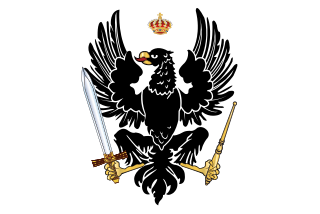
Prussia was a German state located on most of the North European Plain, also occupying southern and eastern regions. It formed the German Empire when it united the German states in 1871. It was de facto dissolved by an emergency decree transferring powers of the Prussian government to German Chancellor Franz von Papen in 1932 and de jure by an Allied decree in 1947. For centuries, the House of Hohenzollern ruled Prussia, expanding its size with the Prussian Army. Prussia, with its capital at Königsberg and then, when it became the Kingdom of Prussia in 1701, Berlin, decisively shaped the history of Germany.
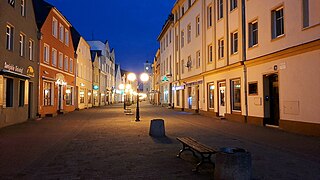
Żagań is a town in western Poland, on the Bóbr river, with 25,731 inhabitants (2019). The town is the capital of Żagań County in the historic region of Silesia. Previously in the Zielona Góra Voivodeship (1975–1998), Żagań has been in the Lubusz Voivodeship since 1999.

Events from the year 1786 in Canada.

Hugo Stumberg Kołłątaj, also spelled Kołłątay, was a prominent Polish constitutional reformer and educationalist, and one of the most prominent figures of the Polish Enlightenment. He served as Deputy Chancellor of the Crown between 1791–92. He was a Roman Catholic priest, social and political activist, political thinker, historian, philosopher, and polymath.
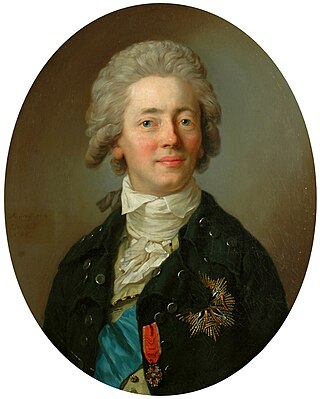
CountStanisław Kostka Potocki was a Polish nobleman, politician, writer, public intellectual and patron of the arts.
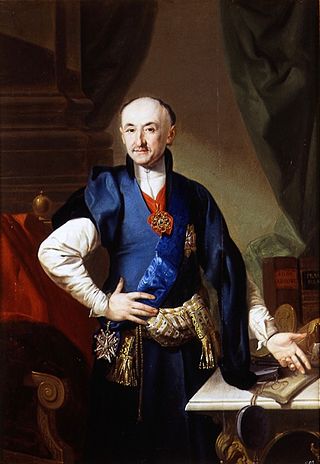
Jacek Małachowski, of the Nałęcz coat-of-arms (1737–1821) was a Polish nobleman, politician and administrator as well as Polish chancellor.

Przysucha is a town in south-central Poland. Located in historic Lesser Poland, it is part of the Masovian Voivodeship, about 100 km southwest of Warsaw and 40 km west of Radom. It is the capital of Przysucha County, and the town 6,762 inhabitants (2004). Its name in Yiddish is פּשיסכע or פשיסחא or פשיסכא. In the past, it was home to a number of Hasidic Rabbis, such as The Holy Jew and Simcha Bunim of Peshischa.
Romanticism in Poland, a literary, artistic and intellectual period in the evolution of Polish culture, began around 1820, coinciding with the publication of Adam Mickiewicz's first poems in 1822. It ended with the suppression of the January 1863 Uprising against the Russian Empire in 1864. The latter event ushered in a new era in Polish culture known as Positivism.

Saint John the Evangelist Catholic Church is a parish of the Roman Catholic Church in Maryland in the United States founded by Fr. John Carroll in 1774. It falls under the jurisdiction of the Archdiocese of Washington and its archbishop. It is named after John the Evangelist.

Józef Andrzej Załuski was a Polish Catholic priest, Bishop of Kiev, a sponsor of learning and culture, and a renowned bibliophile. A member of the Polish nobility (szlachta), bearing the hereditary Junosza coat-of-arms, he is most famous as co-founder of the Załuski Library, one of the largest 18th-century book collections in the world.

Franciszek Ksawery Lampi, also known as Franz Xaver Lampi, was a Polish Romantic painter born in Austria of ethnic Italian background. He was associated with the aristocratic circle of the late Stanisław II Augustus, the last Polish king before the foreign partitions of Poland. Lampi settled in Warsaw around 1815 at the age of 33, and established himself as the leading landscape and portrait artist in Congress Poland soon after Napoleon's defeat in Russia.

Domenico Merlini was an Italian-Polish architect whose work was mostly in the classical style.

Tadeusz Czacki was a Polish historian, pedagogue and numismatist. Czacki played an important part in the Enlightenment in Poland.

Thomas Villiers, 1st Earl of Clarendon, PC was a British politician and diplomat from the Villiers family.

The Netze District or District of the Netze was a territory in the Kingdom of Prussia from 1772 until 1807. It included the urban centers of Bydgoszcz (Bromberg), Inowrocław (Inowraclaw), Piła (Schneidemühl) and Wałcz and was given its name for the Noteć River that traversed it.
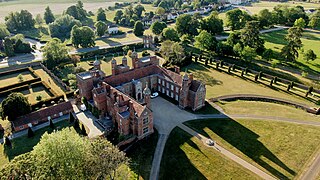
Melford Hall is a stately home in the village of Long Melford, Suffolk, England. Since 1786 it has been the seat of the Parker Baronets and is still lived in by the Hyde Parker family. Since 1960 it has been owned by the National Trust.

Jan Krzysztof Kluk was a Polish naturalist agronomist and entomologist.

Nowosady is a village in the administrative district of Gmina Hajnówka, within Hajnówka County, Podlaskie Voivodeship, in north-eastern Poland, close to the border with Belarus. It lies approximately 7 kilometres (4 mi) north-east of Hajnówka and 47 km (29 mi) south-east of the regional capital Białystok.

Nowa Jasienica - is a settlement in the administrative district of Gmina Police, within Police County, West Pomeranian Voivodeship, in north-western Poland, close to the German border. It lies approximately 12 kilometres (7 mi) north-west of Police and 23 km (14 mi) north-west of the regional capital Szczecin.

The 1786 Vermont Republic gubernatorial election took place throughout September, and resulted in the re-election of Thomas Chittenden to a one-year term.
![]() Media related to 1786 in Poland at Wikimedia Commons
Media related to 1786 in Poland at Wikimedia Commons